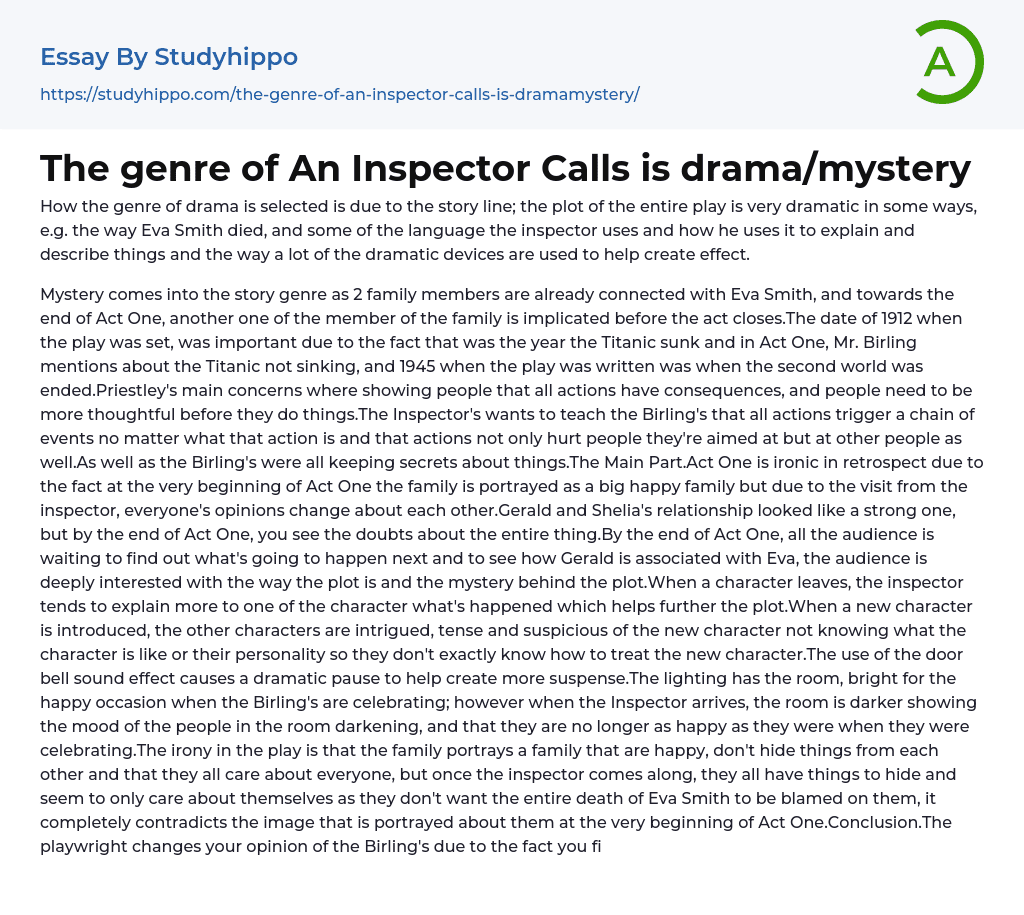

The genre of An Inspector Calls is drama/mystery Essay Example
How the genre of drama is selected is due to the story line; the plot of the entire play is very dramatic in some ways, e.g. the way Eva Smith died, and some of the language the inspector uses and how he uses it to explain and describe things and the way a lot of the dramatic devices are used to help create effect.
Mystery comes into the story genre as 2 family members are already connected with Eva Smith, and towards the end of Act One, another one of the member of the family is implicated before the act closes.The date of 1912 when the play was set, was important due to the fact that was the year the Titanic sunk and in Act One, Mr. Birling mentions about the Titanic not sinking, and 1945 when the play was written was when the second wo
...rld was ended.Priestley's main concerns where showing people that all actions have consequences, and people need to be more thoughtful before they do things.The Inspector's wants to teach the Birling's that all actions trigger a chain of events no matter what that action is and that actions not only hurt people they're aimed at but at other people as well.As well as the Birling's were all keeping secrets about things.The Main Part.Act One is ironic in retrospect due to the fact at the very beginning of Act One the family is portrayed as a big happy family but due to the visit from the inspector, everyone's opinions change about each other.Gerald and Shelia's relationship looked like a strong one, but by the end of Act One, you see the doubts about
the entire thing.By the end of Act One, all the audience is waiting to find out what's going to happen next and to see how Gerald is associated with Eva, the audience is deeply interested with the way the plot is and the mystery behind the plot.When a character leaves, the inspector tends to explain more to one of the character what's happened which helps further the plot.When a new character is introduced, the other characters are intrigued, tense and suspicious of the new character not knowing what the character is like or their personality so they don't exactly know how to treat the new character.The use of the door bell sound effect causes a dramatic pause to help create more suspense.The lighting has the room, bright for the happy occasion when the Birling's are celebrating; however when the Inspector arrives, the room is darker showing the mood of the people in the room darkening, and that they are no longer as happy as they were when they were celebrating.The irony in the play is that the family portrays a family that are happy, don't hide things from each other and that they all care about everyone, but once the inspector comes along, they all have things to hide and seem to only care about themselves as they don't want the entire death of Eva Smith to be blamed on them, it completely contradicts the image that is portrayed about them at the very beginning of Act One.Conclusion.The playwright changes your opinion of the Birling's due to the fact you find out how they truly act, at the beginning of the Act One, they seem
like a normal Upper-Class family celebrating but going through Act one you discover that they are petty, selfish and greedy unlike what the beginning portrays them to look like.They also seem to not care about their actions as long as it doesn't concern them and that they don't care much for the lower-class people.Priestley uses a lot of empathy for Eva in Act One to help involve the audience as you feel real pity for her due to the fact she was fired for simple reasons and that she struggled.He also twists the plot in ways you don't expect to help maintain the audiences interest.The overall message of the playwright was, that all action have consequences and you need to think before you act as you don't know what your actions might cause and you need to take into consideration other people thoughts and feelings.It is still relevant due to the fact, people should still think that and that they don't act how the Birling's did only caring for themselves.
- Book Summary essays
- Metaphor essays
- Reader essays
- Rhyme essays
- Literary devices essays
- Villain essays
- Books essays
- Genre essays
- Literary Criticism essays
- Writer essays
- Protagonist essays
- Simile essays
- Poem essays
- Book Report essays
- Book Review essays
- Greek Mythology essays
- Plot essays
- Tragic Hero essays
- Coming of Age essays
- Play essays
- Rhetoric essays
- Rhetorical Question essays
- Translation essays
- Understanding essays
- Reason essays
- Character essays
- Letter essays
- American Literature essays
- Literature Review essays
- Utopia essays
- Poetry Analysis essays
- Dante's Inferno essays
- Between The World and Me essays
- Incidents in The Life of a Slave Girl essays
- Flowers for Algernon essays
- Myth essays
- Everyday Use essays
- Boo Radley essays
- Genesis essays
- Richard iii essays
- Alice in Wonderland essays
- On the road essays
- Ozymandias essays
- The Nightingale essays
- Holden Caulfield essays
- Animal Farm essays
- 1984 essays
- A Hanging essays
- Shooting An Elephant essays
- A Tale Of Two Cities essays



